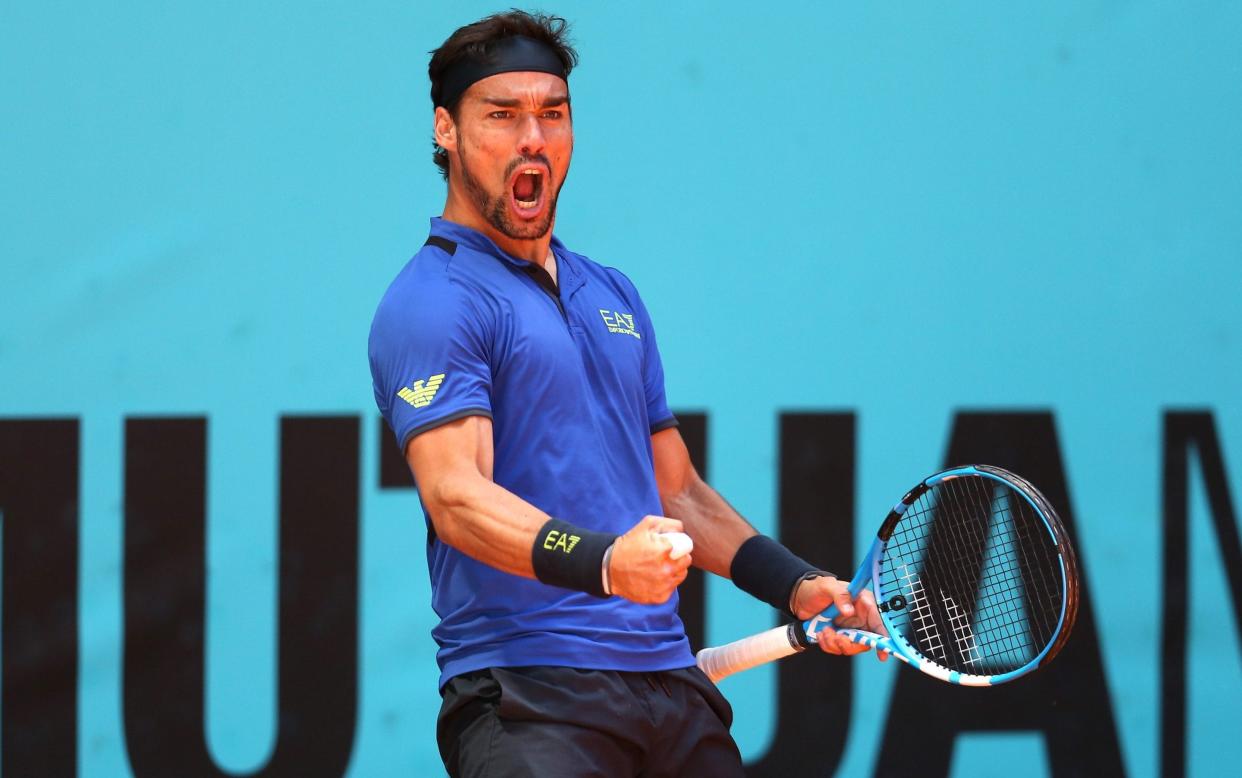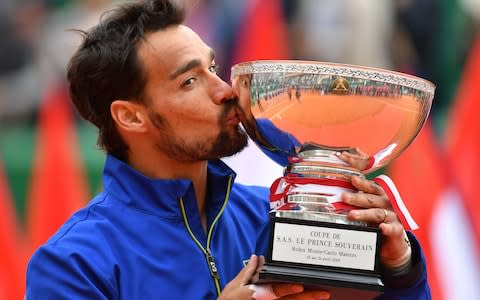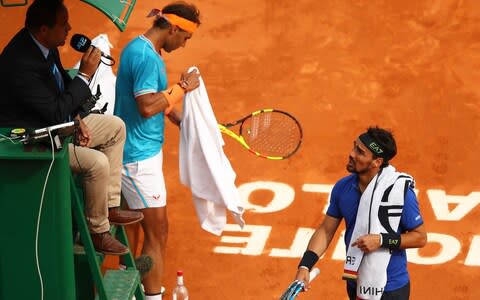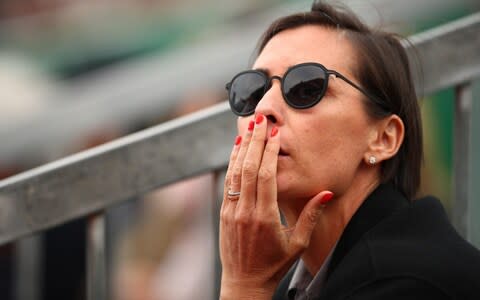Fabio Fognini exclusive interview: 'Will I ever change? No, I gonna stay like this 110 per cent'

In any rogue’s gallery of wild and wacky tennis players, Nick Kyrgios is guaranteed to claim headline status. But coming up on his shoulder is another man who combines dubious self-control with a mercurial talent. And Fabio Fognini, right now, is doing considerably more damage on the court.
This week's Rome Masters will find Fognini returning to an adoring public for the first time since his career burst into bloom in Monte Carlo three weeks ago. Thirteen years after his first Masters tournament, Fognini suddenly came good, beating both world No. 3 Alexander Zverev and defending champion Rafael Nadal on his way to the title.
For the rest of the locker-room, who had written Fognini off as a gifted eccentric with a knack for self-sabotage, this was an alarming moment. What could the little magician achieve if he got his head straight?
In Madrid last week, the Sunday Telegraph attempted to find out. The interview began with Fognini stretched out languidly over a sofa at the Caja Magica, fiddling with the collar of his shiny Armani tracksuit. “You like it?” he asked. “We did a deal, the start of this year. I am Italian. Of course I love clothes.”
Nobody could be more Italian than Fognini. He stands just 5ft 10in – titchy for a top tennis player – but once on the court he puffs his chest out and struts around like a peacock. When his game is flowing, he preens, poses and pouts, showing off his Johnny Depp cheekbones. If he starts missing, he waves his hands angrily at his coaches, or smashes rackets – three in a single changeover in Marrakech last month.

Fognini’s on-court indiscretions could fill this page, including a particularly appalling outburst at 2017’s US Open, where he called chair umpire Louise Engzell “whore” and “cocksucker”. He was thrown out of the tournament and fined $24,000 – a sentence to which he replied, with little apparent remorse, “They’re all moralists these days.”
Neither did Fognini seem particularly contrite last week, when asked whether he hopes to change his erratic behaviour. “No, I gonna stay like this 110 per cent. Yes sir.” Does he regret anything he has done? “It’s part of the career. When you do something wrong you have just to say sorry. Everybody commit a mistake.” He calls a halt to the interview moments afterwards, with a brusque “Finito.”
While Fognini’s crimes clearly deserve censure, there’s also plenty to admire in his game. He plays with a loose and flexible arm, which he snaps like a whip to leave opponents dumbfounded and flat-footed. Hence the comparison with Kyrgios: these two men combine often indefensible antics with a capacity to hit shots other players couldn’t even conceive of.
Fognini is also a popular figure in the locker-room, with a ready smile and a friendly quip for everybody. The one person he seems to wind up – judging by a tetchy post-match interview in Monte Carlo – is Nadal.
This could be because Fognini has beaten Nadal four times – a tally bettered, among current players, only by the rest of the Big Four and Juan Martin del Potro. Or it could be because they are so different in their approaches: the earnest workhorse and the devil-may-care dilettante.

Does Fognini feel that his unpredictable talent makes his opponents anxious? “Is true,” he replied, “because when I am fit, when I am healthy, when my tennis is going the perfect way, I think I am really dangerous. Rafa, I was almost to beat him 6-0 [the Monte Carlo scoreline finished at 6-4, 6-2] and I don’t know how many 6-0 he did in his life.”
At the same time, don’t other players think that if they hang in the match, and scramble enough balls back, he will eventually do something daft or lose focus? “Yeah, probably they say that. But at this time, when you win your first big tournament at the age of 32, I think you have more experience. I am not like before.”
It would be a risky business to claim that Fognini has achieved maturity. Yet he gives the impression that he might be moving in that direction. One possible explanation relates to his young family. In 2016, he married Flavia Pennetta, the previous year’s US Open champion. The following summer, she gave birth to a boy: Federico.
“Now is disaster,” joked Fognini, when I ask him about another very Italian trait: his passion for fast cars and motorbikes. “Is only Federico, Federico, Federico all the time.” Has fatherhood changed him? “Of course. Especially when I lose, and I go out with my family. I am not thinking ‘F---, that forehand,’ or ‘I can do serve-and-volley, drop-shot, whatever.’ I separate the two things and I think it’s really good.”

And Pennetta? Does she live up to the stereotype of the strong Italian woman? “That’s true. They are different, for sure. You see it with Francesca [Schiavone, the 2012 French Open champion] too.
“Flavia was my assistant coach last week, because Franco [Davin, the regular occupant] was home. It was a really tough period. I was losing a little bit. [Five successive defeats, in fact, coming into Monte Carlo.] She was with me, talking a lot. And it’s really difficult to talk to me because I was not talking with nobody! It really helped me a lot, and at the age of 32, I won the biggest title of my career.”
Despite Fognini’s repeated citing of his advanced age, he won’t actually turn 32 until Friday week. He comes from what must be the toughest micro-generation in tennis history, for Novak Djokovic and Andy Murray were both born in the same month: May 1987. Yet even if this made for a tough baptism at junior level, Fognini’s relatively low-impact approach to training has helped him stay the course. On Monday, as Murray continues to rehab his metal hip joint, Fognini will climb to a career high of No. 11 in the world.
“We all see that even in juniors there are these two guys, they play amazing,” Fognini said. “Anybody who knows tennis say they will be on top of the ranking. Me, I am just a guy with the talent, so you never know. I think they were two steps up.”
So what made the difference: technique, physicality or psychology? “Probably in the mind. They are strong and they do everything difficult and in a different way.
“Everybody is different,” Fognini concluded. “That is the good of our sport and our world.” It’s an apt slogan for this most singular of champions.

